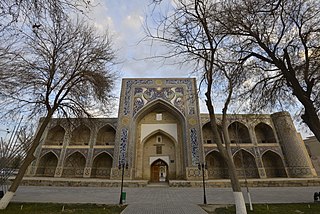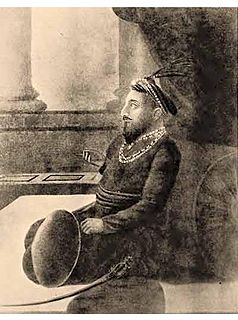Imam Quli Khan may refer to:

Mullá Husayn, also known by the honorific Jináb-i Bábu'l-Báb, was a Persian religious figure in 19th century Persia and the first Letter of the Living of the Bábí religion. He was the first person to profess belief in the Báb as the promised Mahdi of Islam and a Manifestation of God, founding a new independent religion. The title of Bábu'l-Báb was bestowed upon him by the Báb in recognition of his status as the first Bábí.
Sher Khan or Shir Khan may refer to:

Valī Muḥammad Khān the son of jani bek was a leader of the Ashtarkhanid dynasty in the Khanate of Bukhara from 1605–1611 AD.

Lab-i Hauz, sometimes also known as Lyab-i Khauz, a Russian approximation, is the name of the area surrounding one of the few remaining hauz pools that have survived in the city of Bukhara, Uzbekistan. Until the Soviet period, there were many such pools, which were the city's principal source of water, but they were notorious for spreading disease and were mostly filled in during the 1920s and 1930s.

Imam-Quli Khan was an Iranian military and political leader of Georgian origin who served as a governor of Fars, Lar and Bahrain for the shahs Abbas I and Safi.

The Undiladze were a Georgian noble family whose members rose in prominence in the service of Safavid Iran and dominated the Shah’s court at a certain period of the late 16th and early 17th centuries.

David II also known as Imām Qulī Khān, of the Bagrationi Dynasty, was a king of Kakheti in eastern Georgia from 1709 to 1722. Although a Muslim and a loyal vassal of the Safavid dynasty of Iran, he failed to ensure his kingdom’s security and most of his reign was marked by Lekianoba - incessant inroads by the Dagestani mountainous clansmen.

Heraclius I or Nazar Alī Khān (1642–1709), of the Bagrationi dynasty, was a Georgian monarch who ruled the kingdoms of Kakheti and Kartli (1688–1703) under the protection of the Safavid dynasty of Iran.

Murshid Quli Khan, also known as Mohammad Hadi and born as Surya Narayan Mishra, was the first Nawab of Bengal, serving from 1717 to 1727.
Dar-ul-Shifa is one part of the Old City of Hyderabad, India, named after the 16th-century hospital it once housed. The location was founded in AD 1591, more than 400 years ago, by Mohammed Quli Qutub Shah, the founder of Hyderabad city. Todday it houses a large population of Shia Muslims and comes alive on the days of Muharram and Shia festivals. Most of the households have family members settled abroad, and whose remittances increase the quality of life.
Andhra Muslims or Telugu Muslims is a name given to Muslims hailing from Andhra Pradesh, India. Andhra Muslims have different traditions and culture both from the rest of the Muslim world and the wider culture of the area they live in. Andhra Muslims speak a distinct dialect of Urdu, referred to as Dakhini, however, most Andhra Muslims are fluent in Telugu as well. Urdu is the second official language in Kadapa, Kurnool, Anantapur, Nellore, Chittoor and Guntur districts of Andhra Pradesh, where Andhra Muslims are significant in numbers.
Quli Khan, Qulī Khān, Qoli Khan, Qolī Khān is another name of Goli Khun.
Muhammad Quli is a Turkic-derived Muslim male given name meaning 'slave of Muhammad'. It is built from quli. It is equivalent to Arabic-derived Abd al-Muhammad or Persian-derived Gholammohammad.
Imam Quli may refer to:
The Afshars of Urmia refers to a branch of the Afshar tribe centered in the Iranian city of Urmia. From 1624/25 to 1820/21, the governorship of Urmia was mainly in the hands of the Urmia Afshars. After that, only a few them served as its governor, the last one being Imam Quli Khan, who became governor in 1879/80.

Imam Quli Khan (1582–1644) was the son of Din Muhammad Khan and the third ruler of the Bukhara Khanate, who reigned from 1611 to 1642.
Ali Quli is a Turkic-derived Muslim male given name meaning 'slave of Ali'. It is built from quli. It is equivalent to Arabic-derived Abd al-Ali or Persian-derived Gholamali.
Shah Quli is a Turkic-derived male given name meaning 'slave of the Shah'. It is built from quli.
Imam Quli is a Turkic-derived Muslim male given name meaning 'slave of the Imam'. It is built from quli.